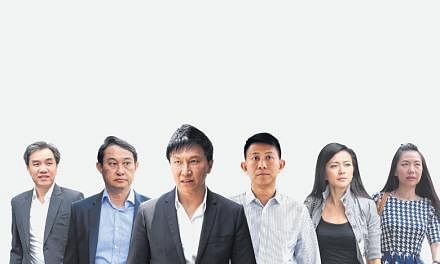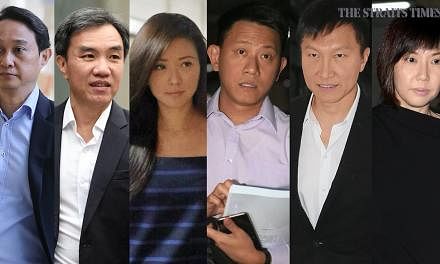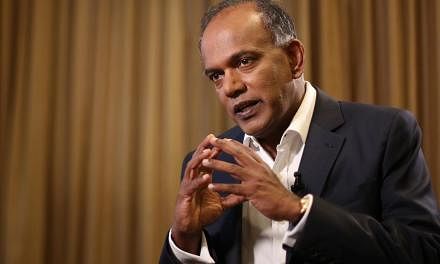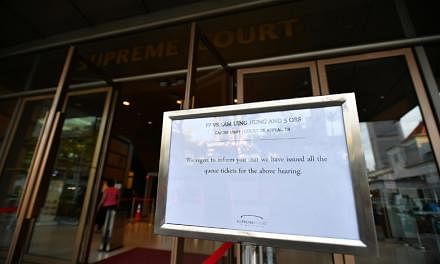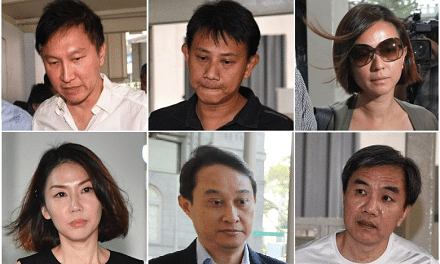SINGAPORE - Members of Parliament rose to question Home Affairs Minister K. Shanmugam, after his speech on Monday (Feb 5) on amending the law to plug the gap that has arisen in the City Harvest case involving the misuse of millions to fund the career of pastor-founder Kong Hee's singer-wife, Ho Yeow Sun.
Here are some of the questions and what he said.
Q: Ms Cheng Li Hui (Tampines GRC) asked why the Government had not amended the law earlier, noting that the Court of Appeal had said that a review is long overdue.
A: Mr Shanmugam replied that since the High Court's decision in a 1976 case, the position has been "settled, clear law", with at least 16 decisions reported in the law books confirming that decision over the years.
The position had been consistently applied by the courts over 40 years, with no doubts or uncertainty expressed.
"Prosecution, defence, everyone proceeded on that basis. And there was no suggestion that the law was in need of any review. There was, therefore, no reason for Parliament to review the position or amend the law. Parliament does not legislate in vain," he said.
Q: Mr Gan Thiam Poh (Ang Mo Kio GRC) asked about comments questioning why the courts had changed its position, given that the precedent had been in place for so long.
A: Mr Shanmugam quipped that he will send Mr Gan a copy of the court judgment online, as it is more than 150 pages.
He noted that the judges felt that when Section 409 of the Penal Code was drafted, it could not have been the intention of the drafters to deal with directors because company law at the time had not developed to the extent that it has now.
Section 409 provides for harsher penalties for certain classes of people who commit criminal breach of trust, including "agents".
For the past 40 years, it has been used to charge directors after the 1976 High Court decision that directors fall under the scope of "agents".
But the court has now ruled that "agents" referred to professional agents in the 19th century, and as such, the provision does not cover directors and key officers in the modern context.
"There are different approaches to interpretation. The other approach is to say, well, you take those words and you apply it as circumstances evolve," said Mr Shanmugam.
He added that the court had also explained why it did not want to do that.
In its judgment, the judges concluded that the task of law reform should be left to Parliament as the courts are "ill-suited, and lack the institutional legitimacy, to undertake the kind of wide-ranging policy review of the various classes of persons who deserve more or less punishment for committing CBT in the 21st century".
The court highlighted problems with the definition of "agents" proposed by the prosecution, noting that it would penalise low-level workers while excluding many categories of people deserving of greater punishment, such as trustees.
Q: Mr Yee Chia Hsing (Chua Chu Kang GRC) noted that Kong's wife, Ms Ho, was a "key beneficiary" but had not been charged. He asked if penalties will be introduced such that the beneficiary of proceeds from a CBT case can also be charged.
A: Mr Shanmugam pointed out that a beneficiary who receives proceeds without the appropriate knowledge does not automatically become a criminal.
"Supposing the person took the money and donated it to a charity, another charity. Does the recipient commit a criminal offence? I think we need to be careful," he said.
He said that the law is currently broad enough to deal with people who act with criminal intention.
Q: Mr Vikram Nair (Sembawang GRC) asked if this case will have a big impact on future cases.
A: Mr Shanmugam said that for cases involving directors or senior officers that are already before the courts, the law as determined by the Court of Appeal will apply to them.
For the cases which are being investigated, the Attorney-General's Chambers will have to take into account the decision in considering the appropriate charges to be brought.
Correction note: An earlier version of the story stated that Mr Gan Thiam Poh is an MP at Tampines GRC. Mr Gan is an Ang Mo Kio GRC MP. We are sorry for the error.


